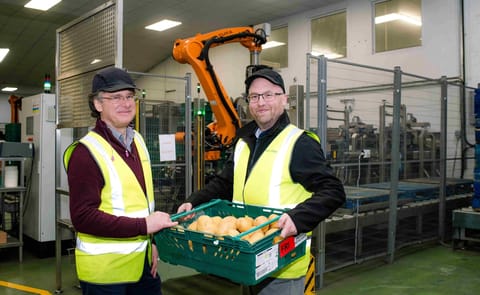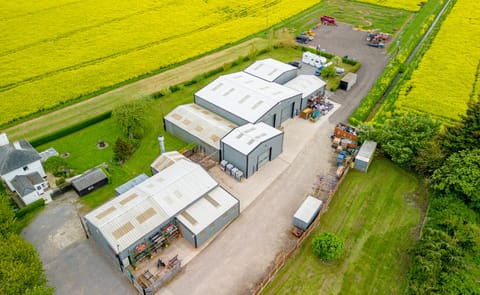Potato Processing in Belgium from 1990 -2017, including potatoes used for processing and production of french fries (Courtesy: Belgapom).
Record Investments in the Belgian Potato Processing Sector continued in 2017

The record year of 2016 for the Belgian potato processing industry continued into 2017, according to Belgapom, the Belgian potato trade and processing industry association.
During the past few years, the Belgian potato industry developed into one of the fastest growing sectors in the Belgian food industry. Partly thanks to the significant investment in capacity and quality, this trend continued in 2017. Thus last year 4.57 million tonnes of potatoes (+ 3.6 %) were processed into fries, crisps, croquettes, flakes, granules and other potato products.
What is noticeable in 2017 is the exceptional increase in products other than fries (crisps, croquettes, mash products, flakes, etc.), which evolved from 468,513 to 690,159 tonnes (+ 47.5%).
The share of frozen and fresh fries rose from 1.91 million tonnes to 1.99 million tonnes (+ 4.3 %), however the share of fresh refrigerated fries fell by 3.5 %.
For the season 2017-2018 statistics show with 5,11 million tons of potatoes an absolute record harvest for Belgium. This increase in resulting from the increase in planted area, the choices of varieties and the influence of weather conditions. The figures published by Belgapom relate to the calendar year of 2017, which spans two potato seasons (2016-2017 and 2017-2018).
According to the latest statistics, Belgium remains by far the largest exporter of frozen potatoes in the world in 2017 with 2.2 million tonnes. The share of third countries continues to increase.
Promotional activities
On the eve of the national holiday in 2017, all the competent authorities recognised the ‘frietkot culture’ as national intangible cultural heritage. On that occasion, Prince Laurent of Belgium granted the mandate of “ambassador of the Belgian frietkot culture abroad” to James Bint, the famous cartoon character who analogously with his homonym ‘James Bond’ has a ‘license to fry’.
Last year, the figure of James Bint was used to start the promotion campaign for ‘Belgian fries, from the heart of Europe’ in southeast Asia. By participating in trade fairs and press events, the Belgian fry producers try to demonstrate the authenticity and quality of the Belgian fries in this fast-growing market of 557 million consumers.
As of today, after all the supply of potato products in Vietnam, Indonesia, the Philippines, Malaysia and Thailand above all comes from North America.
The campaign – with the support of the European Commission – is being carried out by VLAM in cooperation with APAQ-W, FIT and AWEX and will continue in 2018 and 2019. There are events planned in the near future in Singapore, Manilla, Bangkok, Hanoi and Ho Chi Minh city.
In the week of 9-15 May, the Central World Bangkok – one of the largest shopping centres in the world – will be dominated by “real Belgian fries”.

Original Belgian Fries
Increasing protectionism
But on the other side of the world, a threat is emerging. Belgian (and European) fries risk becoming the victim of protectionist reflexes that threaten international trade.
After unjustified antidumping measures by the Brazilian government (the legal complaint against this by the European companies is still pending), a decision by the Colombian government is soon also expected about a similar case.
The dossier resembles a Swiss cheese with just as many holes (which was also confirmed by the European Commission), but a negative decision here can still lead to unjustified import levies.

Illustration from the brochure Original Fries
Belgapom and the European federation EUPPA have urged the European Commission to increase the pressure to end such practices, where apparently there is no hesitation in falsifying a dossier even during the process.
Sustainable growth
Not only has the Belgian sector chosen to press ahead to guarantee the sustainability of its national potato production by setting up further forms of cooperation via the Potato Branch Organisation, which is to be baptised during Interpom Primeurs (25-27 November 2018).
But Belgapom also supports international cooperation projects within the potato sector in developing countries.For example the project Coalición Chuño by TRIAS in collaboration with a number of other partners such as ILVO, VTI, VLTI and Rotary Torhout, which supports the construction of the first artisanal chuño factory in the world in Peru (a century-old technology for freeze-drying potatoes).
This project will be presented to the whole world as an example of development aid through potatoes during the World Potato Congress in Cuzco (27-31 May 2018).





















